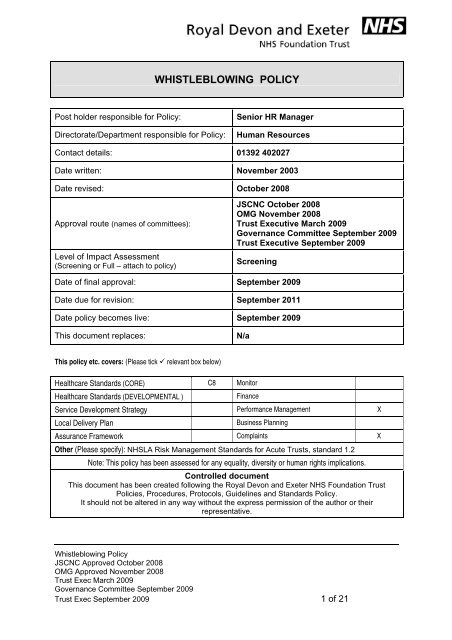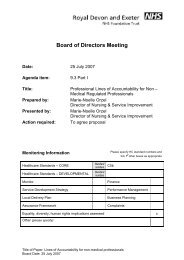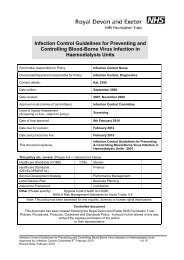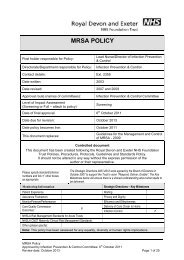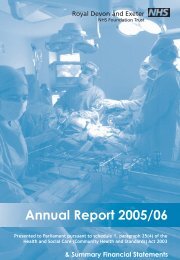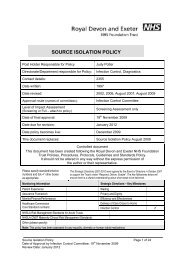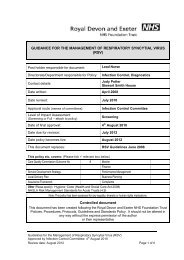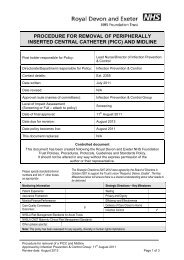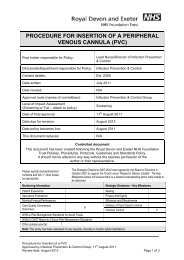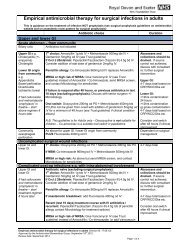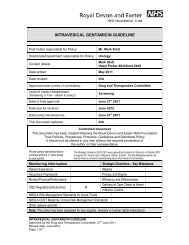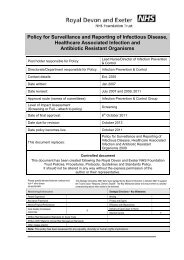WHISTLEBLOWING POLICY - Royal Devon & Exeter Hospital
WHISTLEBLOWING POLICY - Royal Devon & Exeter Hospital
WHISTLEBLOWING POLICY - Royal Devon & Exeter Hospital
Create successful ePaper yourself
Turn your PDF publications into a flip-book with our unique Google optimized e-Paper software.
<strong>WHISTLEBLOWING</strong> <strong>POLICY</strong>Post holder responsible for Policy:Directorate/Department responsible for Policy:Senior HR ManagerHuman ResourcesContact details: 01392 402027Date written: November 2003Date revised: October 2008Approval route (names of committees):Level of Impact Assessment(Screening or Full – attach to policy)JSCNC October 2008OMG November 2008Trust Executive March 2009Governance Committee September 2009Trust Executive September 2009ScreeningDate of final approval: September 2009Date due for revision: September 2011Date policy becomes live: September 2009This document replaces:N/aThis policy etc. covers: (Please tick relevant box below)Healthcare Standards (CORE) C8 MonitorHealthcare Standards (DEVELOPMENTAL )FinanceService Development Strategy Performance Management XLocal Delivery PlanBusiness PlanningAssurance Framework Complaints XOther (Please specify): NHSLA Risk Management Standards for Acute Trusts, standard 1.2Note: This policy has been assessed for any equality, diversity or human rights implications.Controlled documentThis document has been created following the <strong>Royal</strong> <strong>Devon</strong> and <strong>Exeter</strong> NHS Foundation TrustPolicies, Procedures, Protocols, Guidelines and Standards Policy.It should not be altered in any way without the express permission of the author or theirrepresentative.Whistleblowing PolicyJSCNC Approved October 2008OMG Approved November 2008Trust Exec March 2009Governance Committee September 2009Trust Exec September 2009 1 of 21JSCNC October 2008
COMMUNICATION PLANThe following action plan will be enacted once the policy etc. has been approved.Staff groups that need to haveknowledge of the policyAll employees of the Trust, together with bankworkers, the self-employed, contractors andagency staff working within the Trust.The key changes if a revised policy*The key objectivesClarification that the Disciplinary, Capabilityand Appeals Policy & Procedure will apply incases where someone maliciously raises amatter they know is untrue or where there arereprisals against an employee who raises agenuine concern. Addition of a flow chart,management guidelines including the role ofthe Non Executive Director, timescales forresponse times reference Case Managementand sample letters to support the process.Introduction of investigation template.To remind employees of the Trust’s Policy andProcedure for raising work related concerns.How new staff will be made aware of thepolicy, e.g. induction process, cascadeetc.Induction process, intranet.Training available to staffInductionAny other requirements*delete as appropriateWhistleblowing PolicyJSCNC Approved October 2008OMG Approved November 2008Trust Exec March 2009Governance Committee September 2009Trust Exec September 2009 2 of 21JSCNC October 2008
BRIEFING SHEET FOR MANAGERS<strong>WHISTLEBLOWING</strong> <strong>POLICY</strong>1. OVERVIEW OF THE <strong>POLICY</strong>1.1 To remind employees of the Trust’s Policy and Procedure for raising work relatedconcerns.2. CHANGES TO EXISTING <strong>POLICY</strong>2.1 Note that the Disciplinary, Capability and Appeals Policy & Procedure will apply incases where someone maliciously raises a matter they know to be untrue, or wherethere are reprisals against someone who raises a genuine concern. Addition of a flowchart, management guidelines including the role of the Non Executive Director,timescales for response times reference Case Management and sample letters tosupport the process. Introduction of investigation template.3. SPECIFIC ISSUES TO BE RAISED WITH EMPLOYEES3.1 Open to all employees, including permanent, temporary and bank workers. Also tothose who are self-employed, contractors and agency staff working within the Trust.4. MANAGER AND EMPLOYEE ACTION4.1 Managers to ensure that all employees, including those listed under 3.1 above, areinformed of the availability of the policy. Existing employees should be advised of therevisions.5. ISSUES FOLLOWING IMPACT ASSESSMENTS5.1 Open to all those listed in 3.1 above.6. LOCATION OF HARD/ELECTRONIC COPY OF THE <strong>POLICY</strong> ETC.6.1 Trust intranet under Policies and Procedures.Whistleblowing PolicyJSCNC Approved October 2008OMG Approved November 2008Trust Exec March 2009Governance Committee September 2009Trust Exec September 2009 3 of 21JSCNC October 2008
CONTENTSSectionPage1 Introduction 52 Aims 53 Scope 64 Our Assurances to You 65 How to Raise a Concern Internally 76 How We Will Handle the Matter 97 External Advice 98 If You Are Dissatisfied 109 References 10AppendicesAppendix A Other Relevant Trust Policies/Procedures/Guidelines 11Appendix B Statutory Bodies/Organisations 12Appendix C Management Guidelines 13-14Appendix D Sample Letter of Response to Employee (Whistleblower) 15Appendix ESample Letter to Employee Enclosing Note of InvestigatoryMeeting16Appendix F Whistleblowing – Process Flowchart 17Appendix G Constitution of Panels/Actions to be Taken 18Appendix H Investigation template and guidance 19-21Whistleblowing PolicyJSCNC Approved October 2008OMG Approved November 2008Trust Exec March 2009Governance Committee September 2009Trust Exec September 2009 4 of 21JSCNC October 2008
GUIDELINES FOR EMPLOYEES WISHING TO RAISE WORK RELATEDCONCERNS“If workers bring information about a wrongdoing to the attention of their employers or arelevant organisation, they are protected in certain ways under the Public Interest DisclosureAct 1998. This is commonly referred to as “blowing the whistle”.” www.acas.org.uk1. INTRODUCTION2. AIMSAll of us, at one time or another, may have concerns about what is happening atwork. Usually, these concerns are easily resolved, however, when they are about:• Unethical/Unlawful conduct• Financial malpractice• Dangers to the public or the environment• Breaches of confidentiality and/or security• Concerns about the provision of care to a patient, or care group• Concerns about a colleague’s professional conduct and performance• Deliberate covering up of information about any of the above six mattersit can be difficult to know what to do.You may be worried about raising such issues, or may want to keep the concerns toyourself, perhaps feeling that it is none of your business, or that it is only a suspicion.You may feel that raising the matter would be disloyal to colleagues, managers or tothe organisation. You may decide to say something but find that you have spoken tothe wrong person or raised the issue in the wrong way and are not sure what to donext.The Trust has produced this policy to make clear both your entitlement to raiseconcerns and the way in which you can do this at an early stage and in the right way.We would rather that you raised the matter when it is just a concern, at an earlystage rather than delay and wait for proof. You should, where possible, raiseconcerns within 14 days of the incident or issue.If something is troubling you that you think we should know about or look into, pleaseuse these guidelines. If, however, you are aggrieved about your personal position,please use the Grievance/Dispute Resolution Policy & Procedure, which you can getfrom your Manager or Human Resources Department. These guidelines areprimarily for concerns where the interests of others, patients or employees or of theTrust itself are at risk.If in doubt we would encourage you to raise any issue promptly through the pathwaysdescribed in this policy.Other Trust policies that may be relevant to whistle blowing are shown in Appendix A.Through implementing this policy the Trust aims to protect employees frombeing subjected to a detriment by their employer for making a protected disclosure.In so doing the Trust is complying with the Employment Rights Act 1996 and thePublic Interest Disclosure Act 1998.Whistleblowing PolicyJSCNC Approved October 2008OMG Approved November 2008Trust Exec March 2009Governance Committee September 2009Trust Exec September 2009 5 of 21JSCNC October 2008
The Trust also aims to create a method by which employees can alert it to risks,practices or issues of which it may be unaware and which may be of cause forconcern.3. SCOPEThis policy applies to all employees and Directors of the Trust, including permanent,temporary and bank workers, and also to the self-employed, contractors andagency workers within the Trust.4. OUR ASSURANCES TO YOU4.1 Your SafetyThe <strong>Royal</strong> <strong>Devon</strong> and <strong>Exeter</strong> NHS Foundation Trust Board has approved this policyand is committed to its content and the spirit within which it was written.We undertake that if you raise a genuine concern under these guidelines, these willbe treated seriously and sensitively and you will not be at risk of losing your job orsuffering any form of retribution as a result. Providing you are acting in good faith, itdoes not matter if you are mistaken.The Trust does not extend this assurance to someone who maliciously raises amatter they know is untrue. In this instance this would become a disciplinary matterin line with the Disciplinary, Capability and Appeals Policy and Procedure.4.2 ConfidentialityThe Trust will not tolerate the harassment or victimisation of anyone raising agenuine concern. Reprisals against an employee in such cases will be treated as adisciplinary matter which may lead to a sanction up to and including dismissal.This policy encourages you to raise concerns and not to remain anonymous, byensuring that you will be protected from victimisation. However, if you wish to remainanonymous, we will attempt to protect your identity. This may not always be possibleas employees who report concerns may be required to give evidence as a witness, insituations where disciplinary or criminal action is taken.We will use our discretion in maintaining the anonymity of the individual concernedand will take into account various factors such as the seriousness of the issue(s)raised and the likelihood of obtaining information from alternative sources, whichwould confirm the allegation.We do not encourage employees to make disclosures anonymously. Properinvestigation may be more difficult or impossible if we cannot obtain furtherinformation from you. It is also more difficult to establish whether any allegations arecredible and have been made in good faith. If you are in any doubt you can seekadvice from Public Concern at Work, the independent whistleblowing charity, whooffer a confidential helpline. Their contact details are at the end of this policy withinsection 7.Whilst pursuing the aim of openness, it is imperative that patient confidentiality ismaintained and that confidence in the services provided by the Trust is notunreasonably undermined or compromised. Similarly, as employees have certainWhistleblowing PolicyJSCNC Approved October 2008OMG Approved November 2008Trust Exec March 2009Governance Committee September 2009Trust Exec September 2009 6 of 21JSCNC October 2008
obligations and responsibilities to the Trust as their employer, it is important that theemployer/employee relationship is not compromised.5. HOW TO RAISE A CONCERN INTERNALLY5.1 In the pursuit of service excellence and patient care the Trust encourages all staff toseek continuous improvement in the way in which they carry out their day to dayresponsibilities. In the course of this it would be expected that staff would raiseissues directly with their line managers, to which staff would reasonably expect a fairand consistent response. In this context, issues raised in this way that are notresolved to a satisfactory conclusion and where the concerns relate specifically to theTrust, its employees or its patients, staff should exercise their right to lodge agrievance through the whistleblowing policy.Where an employee believes there is an instance of Fraud being committed, theyshould report this immediately to the Director of Finance and Business Developmentwho will initiate a full investigation into allegations lodged.5.2 Step oneThe Trust operates an open, ‘no blame’ culture in which employees can safely raiseconcerns about malpractice or risks or issues which may cause issues for the Trust,its employees or its patients their line Managers within 14 days of the incident, eitherverbally or in writing. We recognise that there may be exceptions to this timescale.It is not advisable for you to investigate the matter before raising the concern, nor doyou have to wait until you have ‘proof’ of your suspicions. You should not seek toobtain evidence by covert means. You will, however, be expected to demonstratethat there are reasonable grounds for raising the concern under the whistleblowingpolicy.Your line manager has a duty to act on this promptly passing any concern, within 7working days, to the Director of Finance and Business Development or The Directorof Nursing and Patient Care, the named Non Executive Director or one of the JointMedical Directors for consideration.It will be for one of these nominated Directors, together with the Director of HumanResources, to decide whether the incident/issue should be investigated in line withthis policy or whether the issue is already resolved and therefore is only recorded.5.3 Step TwoIf you feel unable to raise the matter directly with your manager, for whatever reason,please raise the matter verbally or in writing with:Miss S. Tracey OR Miss M.N. OrzelDirector of Finance & BusinessDirector of Nursing and PatientDevelopmentCare<strong>Royal</strong> <strong>Devon</strong> and <strong>Exeter</strong><strong>Royal</strong> <strong>Devon</strong> and <strong>Exeter</strong> <strong>Hospital</strong><strong>Hospital</strong> (Wonford)(Wonford)Area E, Level 2 Area E, Level 2Barrack RoadBarrack Road,<strong>Exeter</strong>, <strong>Devon</strong><strong>Exeter</strong>, <strong>Devon</strong>.EX2 5DWEX2 5DWTel. 01392 402362 Tel. 01392 403947Whistleblowing PolicyJSCNC Approved October 2008OMG Approved November 2008Trust Exec March 2009Governance Committee September 2009Trust Exec September 2009 7 of 21JSCNC October 2008
Mr. G. Sturtridge OR Dr. V. Pearce & Mr Martin CooperNon-Executive DirectorJoint Medical Director<strong>Royal</strong> <strong>Devon</strong> and <strong>Exeter</strong><strong>Royal</strong> <strong>Devon</strong> and <strong>Exeter</strong><strong>Hospital</strong> (Wonford)<strong>Hospital</strong> (Wonford)Barrack Road Area E, Level 2<strong>Exeter</strong>, <strong>Devon</strong>.Barrack RoadEX2 5DW<strong>Exeter</strong>, <strong>Devon</strong>.Tel. 01392 403984EX2 5DWTel. 01392 403919Please say if you wish to raise the matter in confidence, so that they can makeappropriate arrangements.5.4 Step ThreeIf these channels have been followed, and you still have concerns which have notbeen addressed, or if you feel that the matter is so serious that you cannot discuss itwith any of the above, please contact the Chief Executive directly:Mrs. Angela PedderChief Executive<strong>Royal</strong> <strong>Devon</strong> and <strong>Exeter</strong> <strong>Hospital</strong> (Wonford)Area E, Level 2Barrack Road<strong>Exeter</strong><strong>Devon</strong>EX2 5DWTel. 01392 402357Or, in her absence, Miss Elaine Hobson, Chief Operating Officer, Tel.01392 402391She will then take a decision as to whether an investigation/further investigationneeds to be carried out in line with this policy. If so she will appoint Senior Officers ofthe Trust to undertake the investigation and report back to her.She will report back to you in relation to the issue after her consideration of yourcomplaint or when an investigation has been completed and there is an outcome.5.5 AppealEmployees have the right of appeal if they believe that the process of theirwhistleblowing complaint was not followed as described within the policy. Appealshould be made to the Chairman within 15 days of the date of the outcome letter.Ms Angela BallattiChairman<strong>Royal</strong> <strong>Devon</strong> and <strong>Exeter</strong> <strong>Hospital</strong> (Wonford)Area E, Level 2Barrack Road<strong>Exeter</strong><strong>Devon</strong>EX2 5DWWhistleblowing PolicyJSCNC Approved October 2008OMG Approved November 2008Trust Exec March 2009Governance Committee September 2009Trust Exec September 2009 8 of 21JSCNC October 2008
5.6 Fraud and CorruptionIf your concern is about fraud or corruption, you should contact:Miss S. TraceyDirector of Finance & Business Development<strong>Royal</strong> <strong>Devon</strong> and <strong>Exeter</strong> <strong>Hospital</strong> (Wonford)Area E, Level 2Barrack Road,<strong>Exeter</strong><strong>Devon</strong> EX2 5DWTel. 01392 402362OR<strong>Devon</strong> & Cornwall Counter Fraud Servicec/o Internal AuditCrown Yealm HouseSouth Molton<strong>Devon</strong>EX36 3LHLocal Counter Fraud Specialist – Tel. 01769 575118 or 01803 653328Or the National NHS Fraud and Corruption Reporting Line: 0800 028 40 606. HOW WE WILL HANDLE THE MATTEROnce you have told us of your concern, we will assess initially what action should betaken, (see management guidelines at Appendix C, and flowchart at Appendix F).This may involve an internal inquiry, or a more formal investigation. We will tell youwho is handling the matter, how you can contact him/her, and whether your furtherassistance may be needed. We will write to you, summarising your concern, andsetting out how we propose to handle it. When you raise the concern, you may beasked how you think the matter might best be resolved. If you do have any personalinterest in the matter, we do ask that you tell us at the outset. If your concern fallsmore properly within the Grievance/Dispute Resolution Policy & Procedure we will tellyou.We will also appoint a Non Executive Director to oversee the investigation processand their role will be to ensure that the investigation is thorough, fair and objective byreceiving regular progress updates from the investigating manager every 2 weeks asa minimum.While the purpose of these guidelines is to enable us to investigate possiblemal-practice and take appropriate steps to deal with it, we will give you as muchfeedback as we properly can. If requested, we will confirm our response to you inwriting. Please note, however, that we may not be able to tell you the precise actionwe take where this would infringe a duty of confidence owed by us to someone else.7. EXTERNAL ADVICEIf you are unsure whether to use this procedure or you want independent advice atany stage, you may contact:Whistleblowing PolicyJSCNC Approved October 2008OMG Approved November 2008Trust Exec March 2009Governance Committee September 2009Trust Exec September 2009 9 of 21JSCNC October 2008
• if applicable, your staff side representative ;• the independent charity Public Concern at Work on 0207 404 6609. Theirlawyers can give you free confidential advice at any stage about how to raisea concern about serious malpractice at work.7.1 External ContactsWhile we hope these guidelines give you the reassurance you need to raise suchmatters internally, we recognise that there may be circumstances where you canproperly report matters to outside bodies, such as professional regulators or thepolice. Public Concern at Work or, if applicable, your staff side representative, will beable to advise you on such an option and on the circumstances in which you may beable to contact an outside body safely.If you are considering making a disclosure to the media you are strongly advised tofirst seek guidance from a professional, or other representative body. Alternativelyyou may wish to discuss the matter with your manager or professional head.Whilst we hope these guidelines give you the reassurance you need to raise suchmatters internally, we would rather you raised a matter with the appropriate regulator(likely to be the Care Quality Commission) than not at all. Provided you are acting ingood faith and have reasonable grounds for raising the concern, you can also contactthe statutory bodies/organisations shown on Appendix B.If you make the decision to refer to an outside body, you may wish to considerinforming the Chief Executive. However it should be made clear that staff are notrequired to do so.8. IF YOU ARE DISSATISFIEDIf you are dissatisfied with our response, remember you can go to the other levelsand bodies detailed in these guidelines.While we cannot guarantee that we will respond to all matters in the way that youmight wish, we will try to handle the matter fairly and properly. By using theseguidelines, you will help us to achieve this.9. ReferencesBritish Standards Institution Whistleblowing Arrangements – Code of PracticeACASWhistleblowing PolicyJSCNC Approved October 2008OMG Approved November 2008Trust Exec March 2009Governance Committee September 2009Trust Exec September 2009 10 of 21JSCNC October 2008
APPENDIX AOTHER RELEVANT TRUST POLICIES/PROCEDURES/GUIDELINES• Prevention of Harassment & Bullying at Work Policy• Grievance/Dispute Resolution Policy & Procedure• Disciplinary, Capability and Appeals Policy & Procedure• Equal Opportunities Policy• Employment of Related Persons Policy• Health & Safety Policy• Standing Financial Instructions• Countering Fraud in the NHS (Leaflet for staff)Whistleblowing PolicyJSCNC Approved October 2008OMG Approved November 2008Trust Exec March 2009Governance Committee September 2009Trust Exec September 2009 11 of 21JSCNC October 2008
APPENDIX BSTATUTORY BODIES/ORGANISATIONSBritish Psychological SocietySt. Andrews House48 Princess Road EastLeicesterLE1 7DR Tel: 0116 254 9568Health Professionals CouncilPark House184 Kennington Park RoadLondonSE11 4BU Tel: 0207 582 0866General Dental Council37 Wimpole StreetLondonW1G 8DQ Tel: 0207 887 3800<strong>Royal</strong> Pharmaceutical Society of Great Britain1 Lambeth High StreetLondonSE1 7JN Tel: 0207 735 9141Nursing and Midwifery Council23 Portland PlaceLondonW1B 1PZ Tel: 0207 637 7181Whistleblowing PolicyJSCNC Approved October 2008OMG Approved November 2008Trust Exec March 2009Governance Committee September 2009Trust Exec September 2009 12 of 21JSCNC October 2008
APPENDIX C<strong>WHISTLEBLOWING</strong> – MANAGEMENT GUIDELINESThese guidelines are to be used in conjunction with the Whistleblowing Policy and aredesigned to guide managers through the process. There is also a flow chart attached toshow the process. (See Appendix F).1. If you receive any concern about malpractice, risks or issues, you have a duty to act onthis promptly. You must pass any concern to the Director of Finance and BusinessDevelopment or The Director of Nursing and Patient Care, the named Non ExecutiveDirector or one of the Joint Medical Directors for consideration. It will be for one of thesenominated Directors, together with the Director of Human Resources to decide whether theincident/issue should be investigated in line with this policy or whether the issue is alreadyresolved and therefore is only recorded.In instances of suspected fraud the Director of Finance and Business development will followthe Trust Counter Fraud policy.We would prefer you to raise any issue as near to the alleged incident as possible,preferably within 14 days of it occurring. However we do recognise that this will not alwaysbe possible.The nominated Director together with the Director of Human Resources will pass a copy ofthe complaint to the Chief Executive.2. Stage 1. The first stage will be the receipt of a whistleblowing complaint by the ChiefExecutive . He/she may then delegate to one of his/her Executive Directors theresponsibility for investigation into the complaint. The investigation should commencewithin 14 days of investigation team selection. Where the complaint is in relation to anyclinical issue the Medical Director should be included at an early stage, consideration mayalso be given to whether an external specialist advisor, external to the Trust should beengaged. The Executive Director should be accompanied throughout the investigation by anexperienced HR Manager. The complaint should be heard within 21 days of receipt by theChief Executive. Appendix H contains a template to be followed at all investigativemeetings.The Trust will also appoint a Non Executive Director to oversee the investigation processand their role will be to ensure that the investigation is thorough, fair and objective. The NonExecutive Director would not be required to sit in on investigatory meetings or interviews butwould be required to meet the investigating manager regularly throughout the investigationand be appraised of the process of the investigation and the findings. Where the NonExecutive Director has concerns about the process being followed or the ability of either ofthe investigators this should be immediately raised with the Director of Human Resources.3. Stage 2. The Executive Director will meet with the whistleblower and hear the complaintThe whistleblower will be offered rights of representation during any meeting, (entitlement isto a staff side representative or workplace colleague). (See sample letter at Appendix D).This must happen within 21 days of receipt by the Chief Executive.4. The notes of the investigation meeting with the whistleblower should be forwarded to thewhistleblower as soon as reasonably practicable, so that they may check the notes foraccuracy(See sample letter at Appendix E). They should then hand write any amendments,remembering that this is a record of the investigation meeting. The whistleblower may if theyWhistleblowing PolicyJSCNC Approved October 2008OMG Approved November 2008Trust Exec March 2009Governance Committee September 2009Trust Exec September 2009 13 of 21JSCNC October 2008
wish add a separate page of any additional information they have remembered since themeeting. On completion this should be signed and returned to the investigation team.5. At the end of the investigation a report will be formulated which will go to the ChiefExecutive. He/she will then consider whether he/she feels any further investigation isrequired. The report should be prepared within 7 days of the completion of theinvestigation.6. If the report is approved by the Chief Executive and in the event of any of the allegationsbeing found, the report will go to the Governance Committee for consideration of actions tobe taken. At this stage the Director of Human Resources must be informed so that he/shecan ensure that actions requested by the Governance Committee are followed through,within 21 days.7. Following this an outcome letter will be sent to the whistleblower by the Chief Executiveconfirming the outcomes and actions recommended by the Governance Committee, ifappropriate.8. In the event that the investigation team find that the complaint is unfounded they will stillwrite a final written report to the Chief Executive. If the report is approved by the ChiefExecutive an outcome letter will go to the whistleblower from the Chief Executive and thereport will not go to the Governance Committee.9. The whistleblower has the right of appeal if they believe that the process within the policyhas not been followed. Appeal is to the Chairman in line with the Trust’s Disciplinary,Capability and Appeals Policy and Procedure. Appeals should be made to the Chairmanwithin 15 days of the outcome letter.10. On receipt of the appeal against the process the Chairman will discuss with the Boardcollectively whether they feel that the investigation undertaken was appropriate or if they feelthat further investigation should be undertaken.11. In the event that further investigation is deemed appropriate it will be for the Chairmanand the Director of Human Resources to jointly agree an appropriate senior member of theTrust team to undertake this investigation with an experienced HR Manager. These shouldnot be the same managers as the original investigation. The further investigation shouldtake place within 21 days of the decision.12. A report (within 7 days of the completion of the investigation) will go to the Chairmanand the Director of Human Resources, who will then consider whether they require anyfurther investigation13. If the report is approved by the Chairman and the Director of Human Resources, and inthe event of any of the allegations being found, the report will go to the Board forconsideration of actions to be taken. At this stage the Director of Human Resources mustensure that actions are followed through.14. Following consideration by the Board an outcome letter will be sent to the whistleblower,from the Chairman, confirming the outcomes and actions to be taken if appropriate. Theletter should be sent within 7 days of the Board decision.15. In the event that the complaint is unfounded an outcome letter will go from the Chairmanto the whistleblower and the report will not go to the Board.16. There is no further right of appeal against the process or decision at this stage.Whistleblowing PolicyJSCNC Approved October 2008OMG Approved November 2008Trust Exec March 2009Governance Committee September 2009Trust Exec September 2009 14 of 21JSCNC October 2008
APPENDIX DSAMPLE LETTER OF RESPONSE TO EMPLOYEE (WHISTLEBLOWER)DearI am writing to confirm receipt of your letter dated ……………. in which you have formallyraised concerns regarding………………………………After consideration of the issues that you have raised I have made the decision thatEITHER:a) the concerns you have raised fall more properly within the Grievance/Dispute ResolutionPolicy and Procedure (copy attached), and if you wish to take the matter further youshould follow the process outlined in that document.You can talk this through in more detail with a member of the HR Operations team whowill be able to talk through the process with you.ORb) I believe that your complaint warrants a formal investigation and I have asked ……………to lead this investigation with a nominated HR representative. They will contact youshortly to arrange to meet with you and hear the detail of your complaint as part of thisinvestigation.Following the initial meeting with yourself, and any appropriate investigations, which willbe decided upon by the nominated investigatory team, a report will be prepared andreturned to me (Chief Executive). I will then consider whether I believe a thoroughinvestigation has been undertaken or whether I require any further actions to beundertaken.Once I am satisfied with the extent of the investigation I will write to you and confirm theoutcomes of the investigation and where appropriate any corrective actions that are tobe undertaken as a result of your raising your concerns.At any formal meeting with the investigatory team you may of course be accompanied atthe hearing by either a staff side representative or workplace colleague.Please confirm your attendance at the meeting, and advise whether you will be bringingsomeone with you and if so, who it will be.If you have any queries about the contents of this letter, please let me know.Yours sincerely,Whistleblowing PolicyJSCNC Approved October 2008OMG Approved November 2008Trust Exec March 2009Governance Committee September 2009Trust Exec September 2009 15 of 21JSCNC October 2008
APPENDIX ESAMPLE LETTER TO EMPLOYEE ENCLOSING NOTES OF INVESTIGATORYMEETINGDearThank you for attending the meeting on ……………… in connection with your complaintconcerning……………………………………………………………………..I enclose a copy of the notes of the meeting for your retention. I would be grateful if youwould sign the second copy of the notes and return it to me denoting that you feel the notesare accurate. If you wish to make any amendments please do so in ink and initial eachchange. I would remind you that the notes are not verbatim and should form an overview ofthe discussions on the day and not any subsequent views. If however you have anysupplementary information that you wish to give you may add this on a separate piece ofpaper and attach it to the notes.Please return these notes within 1 week of receipt of the letter. If not received from you bythis time I will assume that you believe the content to be correct and accurate.Please let me know if you have any questions or concerns.Yours sincerelyWhistleblowing PolicyJSCNC Approved October 2008OMG Approved November 2008Trust Exec March 2009Governance Committee September 2009Trust Exec September 2009 16 of 21JSCNC October 2008
APPENDIX F<strong>WHISTLEBLOWING</strong> – PROCESS FLOWCHARTReceipt of Whistleblowing Complaint heard by Chief Executive or Directorof Finance and Business Development (Stage 1)Chief Executive or nominated deputy to meet with Whistleblower & hear complaint – should be Chief Executive orExecutive Director + HR Director, Whistleblower & Representative (Stage 2). To commence within 14 days and be heardwithin 21 days. Non Executive Director appointed to oversee the process.INVESTIGATION REQUIREDTeam to be nominated, 1 Senior Manager ,1 HR MangerReport to be prepared within 7 days of investigationcompletionNO INVESTIGATION REQUIREDOutcome Letter sent to WhistleblowerWhistleblower has right to appealReport to Chief ExecutiveApprovedGovernance Committee for Comment where allegationsfound onlyNo Appeal RaisedCase ClosedOutcome Letter Sent to Whistleblower with Right ofAppealAppeal to Chairman and HR DirectorWithin 15 days of date of outcome letterChairman & HR Director to discuss with Board whether furtherinvestigation needed or not.Satisfied with investigation findings – Outcome letter sentto Whistleblower. Case ClosedHR Director to ensure actions undertaken as result ofWhistleblowing complaint and report to Chair and ChiefExecutiveNot Satisfied with investigation findingsFurther Investigation Required,must take place within 21 days of decision.Investigation team reformed and additionalinvestigation undertakenChair & HR Director to reviewadditional evidenceSatisfiedGovernance CommitteeOutcome letter to Whistleblower within 7 days ofcommitteeJSCNCNo furtherOctoberappeal2008HR Director to ensure actions undertaken as resultof Whistleblowing complaint and report to Chair andChief Executive
APPENDIX GCONSTITUTION OF PANELS/ACTIONS TO BE TAKENACTION UNDERTAKEN BY TIMESCALEComplaint raised withChief ExecutiveEmployee Where possible, within 14days of incident or issueInvestigationComplaint heardChief Exec or nominateddeputy + HR Director tonominate Senior Manager+ HR ManagerSenior Manager + HRManager to meet withemployee whereappropriate. Employeehas right to berepresented by staff siderep. or work basedcolleague. Non ExecutiveDirector to overseeprocess + to receiveregular updates at leastevery 2 weeks.arising.To begin within 14 days ofnominationcomplaint heard within 21 daysof commencement ofinvestigation.Report to Chief Executive Investigation Panel Within 7 days of completion ofinvestigationReport to GovernanceCommittee for commentInvestigation Panel Within 7 days of completion ofinvestigation where allegationsAppealChairman and HR Directorto discuss with Board.foundWithin 15 days of receipt ofoutcome letterActions undertaken as aresult of complaint + reportto Chair and ChiefExecutive.ORFurther investigationundertaken.Report to Chairman +HR DirectorReport to Board (ifcomplaint allegations arefound).Outcome letter toemployee with actions tobe taken.Oversee actions to betaken and report to Chairand Chief Exec.HR DirectorSenior member of Trustteam + experienced HRManager. (Must not havebeen involved in originalinvestigation).Investigation Panelto prepareInvestigation PanelHR DirectorWithin 21 daysTo begin within 21 daysWithin 7 days of completion ofthe investigationWithin 7 daysWithin 7 daysReport within 7 days ofcompletion of actionsWhistleblowing PolicyJSCNC Approved October 2008OMG Approved November 2008Trust Exec March 2008Governance Committee September 2009Trust Exec September 2009 18 of 21Page 18 of 21
Appendix HInvestigation interview templateIntroductionThis template is designed as a guide for managers to be used during theinvestigatory meetings with both the whistleblower and any employees who attendinvestigatory meetings as part of this process.The list of areas to cover are the essentials for all investigating managers and he/sheshould also add the specific areas of questioning after discussing this with their HRlead.Any investigation must ensure that all parties whether the whistleblower or thosebeing investigated are managed sensitively and equally, affording all the right ofrepresentation and accompaniment by either a staff side representative or workplacecolleague.A record of all meetings must be made, such may not be verbatim notes but shouldrepresent the key aspects of the investigatory meeting as detailed below. It shouldalso recognise the need for adjournments/breaks and the reason for these.Whistleblowing PolicyJSCNC Approved October 2008OMG Approved November 2008Trust Exec March 2008Governance Committee September 2009Trust Exec September 2009 19 of 21Page 19 of 21
Investigation templateComplaint …………………………………………………………………………………….………………………………………………………………………………………………….………………………………………………………………………………………………….Employee …………………………………………………………………………………….Whistleblower - Does he/she wish to remain anonymousWitness ……………………………………………………………………………………….Contact Details ………………………………………………………………………………………………………………………………………………………………………………….Questions/tasks Role CompletedWelcome to the meeting and thank for attendingInvestigating managerRight of representationInvestigating Manager• Check that the employee is aware of their right of and HR leadrepresentation• Note names of any representative and which union ifappropriateOutline process for the meeting WhistleblowerInvestigating manager• Ensure the witness knows that the meeting will benoted and the statement may be used in a formalprocess such as a disciplinary case at a later stage.• Listen fully to details of complaint and take copies ofany written evidence that the whistleblower is able togive. He/she may ask their representative to assistthem in giving their version of events.• Ensure that you reassure and acknowledge that this isa difficult situation and support employee in theprocess• Ask questions to clarify or understand employeeversion of events.• Allow time for the employee to clarify.• When you believe that you have a clear picture ofevents reflect your understanding back to thewhistleblower to check.• Detail any amendments they may make• If the meeting is difficult and heated ensure that youare clear with the employee about the need to remaincalm, allow breaks for feelings to subside and ensurethat these issues are appropriately reflected in thenotes.Whistleblowing PolicyJSCNC Approved October 2008OMG Approved November 2008Trust Exec March 2008Governance Committee September 2009Trust Exec September 2009 20 of 21Page 20 of 21
Outline process for the meeting Witness• Ensure the witness knows that the meeting will benoted and the statement may be used in a formalprocess such as a disciplinary case at a later stage.• Explain the reason for the meeting and what you arethere to discuss. Ensure that the witness is clearabout the areas that you wish to discuss with them. Ifthere is written evidence they may need time to lookthrough this and consider there response. Ifnecessary adjourn to allow them time to do this.• Listen fully to details given by the witness, he she mayask their representative to assist them in giving theirversion of events.• Ensure that you reassure and acknowledge that this isa difficult situation and support witness in the process• Ask questions to clarify or understand witness versionof events• Allow time for the witness to clarify.• When you believe that you have a clear picture ofevents reflect your understanding back to the witnessto check.• Detail any amendments they may make• If the meeting is difficult and heated ensure that youare clear with the employee about the need to remaincalm, allow breaks for feelings to subside and ensurethat these issues are appropriately reflected in thenotes.Closing the meeting• Confirm that the notes will be typed and sent to themto check that this is an accurate reflection of themeeting. They should sign and return as soon aspossible retaining a copy.• Ensure that the employee is reminded that thesenotes may be used in any formal process for instancea disciplinary case.• Ensure that the employee is supported at the end ofthe meeting, it may be appropriate to offer counsellingor occupational health support.• Ensure that the employee has a contact number forany remaining queries concerning the meeting.Whistleblower at the close of the meeting• You will need to be clear about timescales for theinvestigation• Inform whistleblower about your intention to regularlyupdate them, how this will happen and when• Give them a contact number for any queries• Reassure whistleblower that you are taking theircomplaint seriously and will deal with matters as soonas reasonably practicable.Investigating ManagerInvestigating ManagerInvestigating ManagerWhistleblowing PolicyJSCNC Approved October 2008OMG Approved November 2008Trust Exec March 2008Governance Committee September 2009Trust Exec September 2009 21 of 21Page 21 of 21


